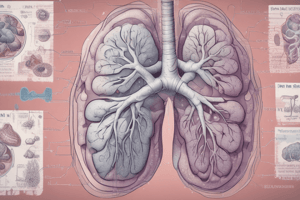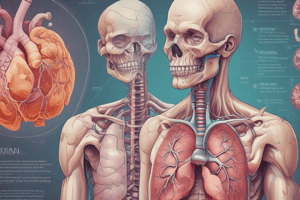Podcast
Questions and Answers
What is pneumonia?
What is pneumonia?
- An inflammatory reaction of the pleura and interstitium of the lung
- An inflammatory reaction of the bronchi and interstitium of the lung
- An inflammatory reaction of the trachea and interstitium of the lung
- An inflammatory reaction of the alveoli and interstitium of the lung (correct)
What are the most common causative agents of acute pneumonia?
What are the most common causative agents of acute pneumonia?
- All of the above (correct)
- Inorganic agents only
- Mycoplasma and fungi only
- Bacteria and viruses only
What is the difference between bacterial pneumonia and viral pneumonia?
What is the difference between bacterial pneumonia and viral pneumonia?
Bacterial pneumonia - intra-alveolar neutrophilic inflammation Viral pneumonia - interstitial lymphocytic inflammation
Which of the following is a risk factor for pneumonia?
Which of the following is a risk factor for pneumonia?
Which of the following symptoms is NOT characteristic for pneumonia?
Which of the following symptoms is NOT characteristic for pneumonia?
Which of the following tests will provide you with an aetiological diagnosis?
Which of the following tests will provide you with an aetiological diagnosis?
Patients will be given a 'best guess' antibiotic as treatment.
Patients will be given a 'best guess' antibiotic as treatment.
Organisation is the final stage of pneumonia where complete recovery occurs
Organisation is the final stage of pneumonia where complete recovery occurs
In grey hepatisation alveolar capillaries become engorged with blood and vascular congestion persists
In grey hepatisation alveolar capillaries become engorged with blood and vascular congestion persists
Pneumonia can be caused by inhaling a substance—such as food, drink, vomit or saliva—into your lungs.
Pneumonia can be caused by inhaling a substance—such as food, drink, vomit or saliva—into your lungs.
Pneumonia always occurs in both lungs
Pneumonia always occurs in both lungs
What are the symptoms of acute pneumonia?
What are the symptoms of acute pneumonia?
Antibiotics are a suitable treatment for acute pneumonia
Antibiotics are a suitable treatment for acute pneumonia
Acute pneumonia is a characterised by inflammatory exudate in the alveolar space that consolidates
Acute pneumonia is a characterised by inflammatory exudate in the alveolar space that consolidates
Describe this histology of pneumonia
Describe this histology of pneumonia
Describe the organisation of pneumonia
Describe the organisation of pneumonia
What is the difference between lobar pneumonia and bronchopneumonia?
What is the difference between lobar pneumonia and bronchopneumonia?
What is pneumonia?
What is pneumonia?
What are the routes of infection for acute pneumonia?
What are the routes of infection for acute pneumonia?
What is the most common causative agent of community-acquired pneumonia?
What is the most common causative agent of community-acquired pneumonia?
How can acute bacterial pneumonia be diagnosed?
How can acute bacterial pneumonia be diagnosed?
What is chronic pneumonia?
What is chronic pneumonia?
What are the possible outcomes of pneumonia?
What are the possible outcomes of pneumonia?
What is the most common causative agent of hospital-acquired pneumonia?
What is the most common causative agent of hospital-acquired pneumonia?
What can cause pneumonia due to both irritation and bacteria?
What can cause pneumonia due to both irritation and bacteria?
What is pneumonia and what causes it?
What is pneumonia and what causes it?
What are the most common causative organisms of pneumonia?
What are the most common causative organisms of pneumonia?
What are the three ways pneumonia can be acquired?
What are the three ways pneumonia can be acquired?
What are the classifications of pneumonia?
What are the classifications of pneumonia?
What are the causative organisms of community-acquired pneumonia and hospital-acquired pneumonia?
What are the causative organisms of community-acquired pneumonia and hospital-acquired pneumonia?
What is aspiration pneumonia and what causes it?
What is aspiration pneumonia and what causes it?
What are the possible outcomes of pneumonia?
What are the possible outcomes of pneumonia?
Flashcards
Pneumonia
Pneumonia
Inflammation of the alveoli and interstitium of the lung, usually caused by an infection.
Acute Pneumonia
Acute Pneumonia
A sudden lung infection characterized by fluid buildup and inflammation in the air sacs (alveoli).
Causes of Acute Pneumonia
Causes of Acute Pneumonia
Bacteria, viruses, mycoplasma, fungi, and inorganic agents.
Aspiration Pneumonia
Aspiration Pneumonia
Signup and view all the flashcards
Community-acquired pneumonia (CAP)
Community-acquired pneumonia (CAP)
Signup and view all the flashcards
Hospital-acquired pneumonia (HAP)
Hospital-acquired pneumonia (HAP)
Signup and view all the flashcards
Immunocompromised Pneumonia
Immunocompromised Pneumonia
Signup and view all the flashcards
Common CAP Bacteria
Common CAP Bacteria
Signup and view all the flashcards
Common HAP Bacteria
Common HAP Bacteria
Signup and view all the flashcards
Symptoms of Acute Bacterial Pneumonia
Symptoms of Acute Bacterial Pneumonia
Signup and view all the flashcards
Diagnosis of Pneumonia (Methods)
Diagnosis of Pneumonia (Methods)
Signup and view all the flashcards
Treatment of Pneumonia
Treatment of Pneumonia
Signup and view all the flashcards
Outcomes of Pneumonia
Outcomes of Pneumonia
Signup and view all the flashcards
Chronic Pneumonia
Chronic Pneumonia
Signup and view all the flashcards
Chronic Pneumonia Causes
Chronic Pneumonia Causes
Signup and view all the flashcards
Necrotizing Pneumonia
Necrotizing Pneumonia
Signup and view all the flashcards
Lung Abscess
Lung Abscess
Signup and view all the flashcards
Alveoli
Alveoli
Signup and view all the flashcards
Inflammation of Alveolar Septa
Inflammation of Alveolar Septa
Signup and view all the flashcards
Inflammatory Exudate
Inflammatory Exudate
Signup and view all the flashcards
X-Ray Consolidation
X-Ray Consolidation
Signup and view all the flashcards
Gram +ve
Gram +ve
Signup and view all the flashcards
Gram -ve
Gram -ve
Signup and view all the flashcards
Study Notes
Pathology of Pneumonia: Causes, Symptoms, and Treatment
- Pneumonia is an inflammatory reaction of the alveoli and interstitium of the lung, usually caused by an infectious agent.
- The pathological features of acute pneumonia include inflammatory exudate in the alveolar space that consolidates and inflammation of alveolar septa, leading to the consolidation of affected areas.
- The most common causative agents of acute pneumonia are bacteria, viruses, mycoplasma, fungi, and inorganic agents.
- The routes of infection for acute pneumonia include aspiration of oropharyngeal secretions/gastric contents, inhalation of pathogens, contamination from systemic circulation, alcohol, and cigarette smoke.
- Pneumonia can be classified anatomically, clinically, and microbiologically, with the most clinically relevant classification based on the circumstances surrounding the development of pneumonia.
- The sub-divisions of pneumonia include community-acquired pneumonia, hospital-acquired or nosocomial pneumonia, immuno-compromised pneumonia, aspiration pneumonia, necrotizing pneumonia and lung abscess, and chronic pneumonia.
- Streptococcus pneumoniae is the most common causative agent of community-acquired pneumonia, while Staphylococcus aureus, Enterobacteriacae & Pseudomonas species are common in hospital-acquired pneumonia.
- Aspiration of gastric contents can cause pneumonia due to both irritation of gastric contents and bacteria, with anaerobic bacteria and aerobic bacteria such as S pneumoniae, S aureus, H influenza, Pseudomonas aeruginosa being the most common causative agents.
- Symptoms of acute bacterial pneumonia include fever, chills, dyspnea, cough with or without sputum, crackles on auscultation, and consolidation in radiograph.
- Diagnosis of acute bacterial pneumonia can be made through sputum analysis, X-ray, and FBC, and treatment involves antibiotic therapy.
- Possible outcomes of pneumonia include resolution, organization, abscess formation, empyema, bacteremia, and death.
- Chronic pneumonia is often a localized lesion in an immunocompromised patient, typically caused by bacteria such as Mycobacterium tuberculosis or fungi such as Histoplasma capsulatum, Blastomyces dermatitidis, and Coccidiodies immitis.
Pathology of Pneumonia
- Pneumonia is an inflammatory reaction of the alveoli and interstitium of the lung usually caused by an infectious agent.
- Acute pneumonia is characterized by inflammatory exudate in the alveolar space that consolidates and inflammation of alveolar septa.
- The most common causative organisms of pneumonia are bacteria (Gram +ve: S pneumoniae, Staphylococcus aureus; Gram –ve: Haemophilus influenzae, Klebsiella pneumoniae, Legionella pneumophila), viruses, mycoplasma, fungi, and inorganic agents.
- Pneumonia can be acquired through aspiration of oropharyngeal secretions/gastric contents, inhalation of pathogens, or contamination from systemic circulation.
- Pneumonia can be classified anatomically, clinically, or microbiologically, with the most clinically relevant classification based around the circumstances surrounding the development of pneumonia.
- Community-acquired pneumonia (CAP) is the most common type, caused by Streptococcus pneumoniae, Haemophilus influenzae, Moraxella catarrhalis, Klebsiella pneumoniae, Pseudomonas aeruginosa, Legionella pneumophila, and viruses.
- Hospital-acquired pneumonia (nosocomial) is serious and often life-threatening, caused by Staphylococcus aureus, Enterobacteriacae & Pseudomonas species, and often occurs in patients with underlying diseases, immunosuppression, prolonged antibiotic therapy, invasive access devices, or mechanical ventilators.
- Immuno-compromised patients are at risk of opportunistic infections, such as Mycobacterial infection, Cytomegalovirus (CMV), Herpes simplex, Pneumocystis jiroveci, Candida, and Aspergillus, in addition to usual bacterial/viral/fungal organisms.
- Aspiration pneumonia is due to the aspiration of gastric contents and bacteria, often caused by abnormal gag/swallow reflexes, unconsciousness, repeated vomiting, or poor oral hygiene.
- Necrotizing pneumonia and lung abscess are complications/progressions of pneumonia, frequently causing death, but can resolve with antimicrobial therapy leaving a scar.
- Symptoms of acute bacterial pneumonia include fever, chills, dyspnea, cough with or without sputum, crackles on auscultation, and consolidation in radiograph, with diagnosis through sputum analysis, X-ray, and FBC, and treatment with antibiotics.
- Possible outcomes of pneumonia include resolution, organization, abscess formation, empyema, bacteremia, and death. Chronic pneumonia is often a localized lesion in an immunocompromised patient, typically caused by bacteria (e.g., Mycobacterium tuberculosis) or fungi.
Studying That Suits You
Use AI to generate personalized quizzes and flashcards to suit your learning preferences.




